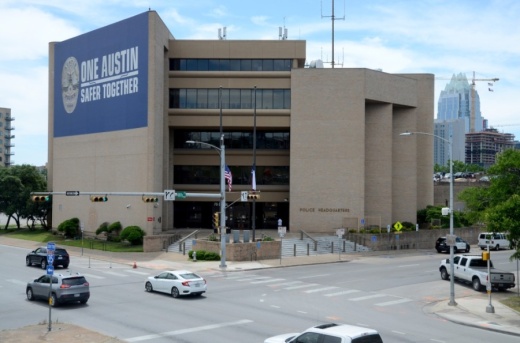Since the May 25 killing of George Floyd by Minneapolis police and ensuing protests that gripped the nation and Austin, large swaths of the community have loudly demanded a transformation in policing and public safety. Groups have called to defund the police by between $100 million-$220 million; to change the size, response and responsibilities of the police force; and to reinvest the savings into programs and services that enhance public safety without armed law enforcement officers.
The momentum of the community movement has led to a City Council budget proposal for fiscal year 2020-21 that some have called significant. The proposal would immediately cut $23.3 million from the police department’s initial proposed $434.3 million budget and would reinvest the money into a variety of community services, from mental health crisis intervention to housing and access to reproductive health care.
The proposal would take another $79.6 million out of the police budget in the form of the operations of forensics lab and the internal affairs department, and it would see the city government commit to making them independent from the police department by the end of FY 2020-21. A longer community process on reimagining public safety would then analyze an additional $49.2 million taken from the police budget—appropriated for a variety of expenses, such as overtime pay and traffic enforcement—and propose alternatives for these dollars and functions that would make the community safer.
In total, that is roughly $152.1 million taken from the initially proposed police department budget, with $23.3 million cut and reinvested, $79.6 million reassigned and $49.2 million awaiting community input. The Austin Police Department budget for FY 2020-21 would sit at $282.2 million—a 35% reduction from what City Manager Spencer Cronk proposed in July. City Council has also suggested only authorizing six months of funding and forcing the elected body to come back by March 2021 to discuss other potential reforms before green-lighting the rest of the department’s money for the year.
Mixed community reactions
According to ongoing conversations among City Council members within their public message board, there appears to be near-unanimous consent for the proposal.
However, Hilda Gutierrez, a representative of Communities of Color United, a local group that advocates for social equity and has led the calls to defund the police, said she was underwhelmed by City Council’s proposal. Gutierrez said that although it looks like City Council may cut more than $150 million from the police budget, only a "disappointing" 15% of it is being reinvested back into the community to enhance public safety.
“After the death of George Floyd, all the City Council members came out and spoke the issue of structural racism so eloquently, ... but to see these numbers coming back to us is very disheartening,” Gutierrez said. “We have to seize this moment, and we have to have people who have power to see that.”
Chas Moore, executive director of the Austin Justice Coalition, which has been at the forefront of discussions around police reform and criminal justice issues in Austin for years, said he was proud of City Council. Moore’s group has been pressing for at least $100 million to be cut from the police budget. Moore said adopting this budget would be a big step but that it also represents only the start of a larger conversation and effort toward transforming public safety in Austin.
Moore further criticized those who believe the city will turn chaotic with fewer police, saying the city has long been chaotic for Black and brown communities because of over-policing.
Cary Roberts, executive director of the Greater Austin Crime Commission, a group that advocates for police interests, said his greatest concerns were the proposed elimination of 30 officer positions, reduced funding to fill officer vacancies and the potential elimination of the cadet classes.
“We know, in a rapidly growing city, we already have a police shortage,” Roberts said. “No doubt about it that City Council is considering the most substantial cuts to the police department in memory. The community is watching closely.”
Still up for debate
How the city will handle the police academy’s cadet classes heading into 2021 remains to be seen.
Issues and concerns regarding local police training and recruitment predate this latest push for police reform. City Council initiated an audit and revamping of training materials in December 2019.
This work is ongoing, and the city has committed not to permit the commencement of another cadet class until the department implements fundamental curriculum changes. City Manager Cronk already canceled June 2020’s cadet class. City staff estimates the changes to cadet training will be ready by November, but the mayor and several City Council members have publicly supported canceling November’s scheduled academy class.
However, City Council remains split on the academy’s fate through 2021. District 4 City Council Member Greg Casar’s suggestion to cut funding for all cadet classes through 2021 has gained some traction. Mayor Steve Adler, with Council Members Alison Alter and Natasha Harper-Madison, have proposed to play it by ear, saying a window for 2021 cadet classes should be left open if a new curriculum is completed.
As of Aug. 12, APD already has 203 vacancies and counting, according to Roberts. City Council’s budget proposal would cut 30 sworn officer positions and remove funding for roughly 70 vacancies that Cronk has determined cannot be reasonably filled in FY 2019-20.
In suggesting his wait-and-see strategy on cadet classes, Adler urged council to consider the growing number of officers leaving the department and the impact it could have on public safety. Council Member Jimmy Flannigan has also supported leaving the window open for cadet classes, saying the city will still need sworn officers next year.
City Council will hear public comment through the evening of Aug. 12. Council members have until Aug. 14 to formally adopt the budget.





